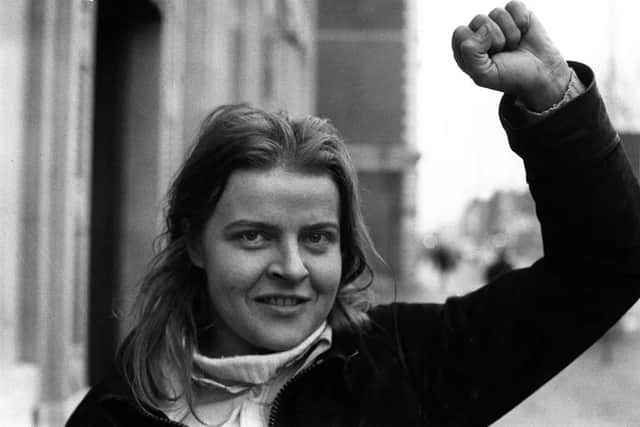Rose Dugdale 'was a terrorist and not a freedom fighter' says ex-SDLP leader amid outpouring of Sinn Fein tributes to upper-class Marxist who designed much of the IRA's arsenal
and live on Freeview channel 276
Margaret Ritchie was commenting on the death of Rose Dugdale in Dublin on Monday, which was followed by an outpouring of tributes to her from Sinn Fein figures.
Dugdale was born into a very wealthy upper-class family in southern England, and attended school in Kensington, central London.


Advertisement
Hide AdAdvertisement
Hide AdHowever, she turned her back on her family and instead drifted into Marxist politics and into the orbit of republican paramilitaries.
Though she has been remembered for her eccentric personal journey, and for her role in two major heists, she was also indirectly responsible for innumerable deaths due to her lethal inventions for the IRA in the 1980s and 1990s.
Baroness Ritchie had been active in the SDLP since the 1980s, and led the party during 2010 and 2011. She now sits under the Labour banner in the House of Lords.
"From my memory, Rose Dugdale caused a lot of destruction, despair and distress to many people," she told the News Letter.


Advertisement
Hide AdAdvertisement
Hide Ad"She was involved in many acts of terrorism as I understand it.
"I've always – and my colleagues – rejected terrorism from whatever source it came, and that position has not dimmed, changed, or dissipated: I still believe terrorism was wrong, and whatever acts of violence and destruction Rose Dugdale was involved in should be condemned.
"I do not see her as a freedom fighter. I simply see her as a terrorist – a misguided terrorist."
She praised the recent images of Sinn Fein and DUP political leaders engaged in joint business, adding: "That's the image we want to see. We do not want images of violence, terrorism, or anything that seeks to divide our society.
Advertisement
Hide AdAdvertisement
Hide Ad"I recall what my former leader John Hume said at the time of the Good Friday Agreement: 'Yes, we have the agreement and that's very important because it represents a contract between nationalists and unionists... but the healing process has to begin.'
"We never really had a healing process, and that's the issue that we now need to concentrate on."
-
‘SHE WAS A GREAT EDUCATOR’
Dugdale was a Sinn Fein member and used to work for An Phoblacht, the party's newsletter.
Her death in her early 80s on Monday was met with the following responses from Sinn Fein.
Advertisement
Hide AdAdvertisement
Hide AdAn official party statement from Dublin South Central TD Aengus O Snodaigh said: "Ireland has today lost a committed republican and activist, and Sinn Fein a valued comrade".
He described her as "an active member of Sinn Fein", "extremely committed to her community", "hugely popular", and "a great educator of Sinn Fein activists".
Martina Anderson, ex-SF MEP and bomber, said: "Rose taught me a lot and I will never forget her. Proud to call Rose a comrade and friend. Heartbroken."
Belfast Sinn Fein councillor Padraig Donnelly (who describes himself as a "sci-fi geek" who uses "he / him" pronouns) tweeted: "Very sad to hear of the passing of Republican legend Rose Dugdale…
Advertisement
Hide AdAdvertisement
Hide Ad"Suaimhneas síoraí ar a hanam [may her soul rest in peace]. Rest in power Rose."
Roisin Tracey, a self-described mental health advocate and Sinn Fein council candidate in Dublin (who last year said "I’d nearly be afraid to recommend politics as a career for young women" because of "hateful comments" they face) said: "Rose was a freedom fighter, a rebel, and most importantly, a friend to many. Rest in peace."
-
‘EVERYTHING WAS ABOUT REBELLION’
A biography of Dugdale by journalist Sean O'Driscoll, featuring interviews with her and family, was published in 2022 (it is called 'Heiress, Rebel, Vigilante, Bomber').
The book says in 1973 she was found guilty of burglary by a court in Exeter after stealing art and heirlooms from her family estate to fund the IRA.
Advertisement
Hide AdAdvertisement
Hide AdShe was sentenced to two years, suspended, because a judge said the chances of her reoffending were "extremely remote" – despite her having given a speech from the dock about how she was a committed "freedom fighter".
Afterwards she complained to waiting reporters that her light sentence was a sign of the justice system's bias towards the upper classes.
The following year she was sentenced in Dublin for stealing 19 precious paintings in Co Wicklow to fund the IRA, and for being part of a team which dropped bombs from a helicopter onto an army barracks in Strabane (the helicopter had been hijacked from Co Donegal).
She got nine years, but was out in six.
She had a son in prison, Ruairi, and her parents wanted to meet him and support him financially – but the book says that her family believed that if they sent money to her, it would likely just be forwarded to the IRA.
Advertisement
Hide AdAdvertisement
Hide AdRuairi wanted to visit his relatives in England, but was barred from doing so by Rose.
She also enrolled him in an Irish language school and in Fianna Eireann, commonly regarded as the IRA's youth wing, with whom he would march and drill in a black beret and green uniform.
She taught him to drop more polite forms of speech too, insisting that he say "wha?" instead of "pardon me?"
Ruairi was quoted in the book as saying that "with Rose, everything was rebellion against the rules; I'm not saying it was a good way to be... I remember going up an escalator in a shopping centre and the next thing I smelt smoke and I looked around and Rose was puffing away on a cigarette. She was only doing it because she wasn't allowed.”
-
DEATH TOLL CAUSED BY DUGDALE
Advertisement
Hide AdAdvertisement
Hide AdUpon her release from prison she became active in Sinn Fein and An Phoblacht, and also began designing and testing weapons.
In the 80s she designed a "drogue grenade": a bomb with a kind of parachute which was used to keep the main force of the blast facing the right direction.
The author writes that this grenade caused "at least" 24 deaths in the five years after it was first introduced.
The book recounts how she designed an armour-piercing bazooka in the 1990s to attack police patrols (one of which killed officer Stephen Gillespie in 1991 in Belfast).
Advertisement
Hide AdAdvertisement
Hide AdShe also helped develop an extra-powerful sniper rifle, a new type of firing mechanism for mortars (used in the 1991 Downing Street attack, where the IRA tried to kill the UK cabinet), plus a new type of explosive substance called "Ballycroy 3-4 mix".
This mix was used in the Glennane Barracks truck bombing of 1991 (three soldiers killed), the Baltic Exchange bomb of 1992 (three civilians killed), the Bishopsgate bomb in 1993 (one civilian killed), and the 1996 Canary Wharf bombing (two civilians killed).
The book's author said Dugdale's "zealotry" was still evident right up until their last interviews before publication in 2022; for example she described the Strabane bombing as "the happiest day of my life".